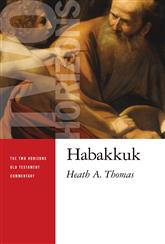A Review of a Commentary on Habakkuk
There are little tapped wells of wisdom in the minor prophets. For many evangelicals, the twelve short books that come between Daniel and Matthew are “lost books” that AWANA kids memorize the order of but may never hear a sermon from.
Treating the minor prophets as flyover country in our annual reading plans is a huge mistake, as is readily apparent in Heath Thomas’ recent commentary on Habakkuk. With only three short chapters, it might seem difficult to fill over two-hundred pages, but this latest entry in the Two Horizons Old Testament Commentary Series never lacks with biblical and theological material to enrich the reader.
Thomas is an Old Testament scholar and the Dean of the Hobbs College of Theology and Ministry at Oklahoma Baptist University. He has published several books, focusing on biblical interpretation and material in Scripture dealing with lament and suffering. Habakkuk offers fertile ground for discussing lament, suffering, providence, and faith.
This commentary on Habakkuk uses a method of interpretation known as “Theological Interpretation of Scripture” or TIS. The approach is often caricatured and sometimes unclearly explained by its proponents. However, Thomas’ exegesis of Habakkuk shows TIS at its best: he deals with the biblical data and linguistic research while setting the book in the rich theological and historical context of its interpretation as Christian Scripture. This is a volume that both honors the text and reads it in light of the whole canon and the tradition of faith which has preserved it.
The book is divided into two parts. Part One begins with a lengthy introduction, followed by a chapter on each of the chapters in Habakkuk. The exegesis in these chapters is section by section, as with many biblical commentaries. Part Two consists of three chapters that explore Habakkuk theologically. Thomas delves into the major themes in Habakkuk as they relate to biblical theology, the relationship between the minor prophet’s short book, prayer, and shalom, and finally the usefulness of Habakkuk for spiritual formation. The first portion of this commentary is helpful, but the second part is worth the price of the book alone.
Habakkuk is a book that is worthy of deeper study, as Thomas makes plain. God’s sovereign power is evident as he gives Habakkuk the promise that he will use a rogue nation still not yet a major power to bring his judgment on injustice and eventually fulfill his purposes. Habakkuk shows the expected degree of disbelief and shock at God’s promise to use the Chaldeans. And yet, by the end of the three chapters, the reader sees that Habakkuk has come to a sense of hope in God’s coming justice, even if he himself does not witness it firsthand.
This commentary is academic and will best be used for deep study of the book of Habakkuk. It will be fruitful reading for professors and students alike. Educated pastors will also find this a useful resource to include in their library. Though studying the book of Habakkuk would benefit many lay people, this volume is likely to be too dense for the average person in the pew.
Though it is geared toward an academic audience, the theological discussions Thomas includes in the latter portion of the volume will make this a tool for both sermon preparation and spiritual formation by pastors who choose to invest in this book. By interpreting the volume through a theological lens—a lens that has been formed and smoothed by millennia of Christian teaching––Thomas has written a volume that is spiritually enriching as well as exegetically precise. In other words, Thomas helps the reader to see both what the text of Scripture says as well as why it matters.
This is a book that deserves attention. It would be a welcome addition to the library of an institution or those who engaged in exegesis of texts. Heath Thomas’ commentary on Habakkuk will be a useful tool for decades to come.















Reading your Bible is a battle. There’s a reason why Paul lists Scripture as the sword of the Spirit in his discussion of the armor of God (Eph. 6:17). More even than that, Scripture reveals God’s character and is, thus, central to worshiping well (Psalm 119). That’s why reading the Bible is a battle.